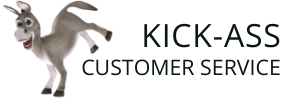3 Super Powerful Customer Service Survey Questions
These three questions will turbocharge your customer service survey.
Administering a customer service survey on a regular basis is one of the most effective strategies to gauge and improve customer service. Indeed, the advent of the Internet has made it easier — and less expensive — to capture customer sentiment, often within mere seconds following a business transaction.
Before we reveal the three incredibly powerful customer service survey questions, let’s briefly review the difference between quantitative and qualitative data. Indeed, a good customer service survey strikes a balance between both quantitative and qualitative data.
Quantitative data focus on numbers, that is, data that can be directly measured. Examples of quantitative data include response time, hold time, and resolution time. The advantage of quantitative data is that such data, when analyzed over time, reveal trends.
Qualitative data focus on descriptions, that is, data that, although not directly measurable, nonetheless provide relevant descriptions. Examples of qualitative data include descriptions of attitude, professionalism, and attentiveness. The advantage of qualitative data is that such data tell stories.
Now, to the three powerful questions to include in your customer service survey. The first two questions are purely qualitative, while the last question incorporates a quantitative component that your business can use to measure over time.
What is the first word or short phrase that comes to mind when you think of our business? This is a powerful question because it succinctly reveals a specific word or short phrase that customers affiliate with your business. Said differently, the question reveals the particular word or short phrase your business “owns.” For example, Google “owns” the word search, FedEx “owns” the phrase overnight delivery, and Nordstrom “owns” the phrase customer service. At the very least, responses to this question will reveal whether customers affiliate your business with either positive or negative words or short phrases.
Tell us about a time when our business exceeded your expectations, and please share the name of the employee involved so that we can recognize her or him. This question serves several purposes. First, the responses and, just as importantly, non-responses reveal whether your business routinely exceeds customer expectations, which is important because research suggests that merely meeting customer expectations might not be enough to retain customers. Second, the responses provide specific examples of how your business exceeds customer expectations. These concrete examples can be used not only for training new employees, but also for testimonials to attract more customers. Third, and perhaps most importantly, the responses allow your business to recognize outstanding employees, a powerful strategy that motivates employees to provide exceptional customer service.
I cannot imagine the world without our business: (a) strongly disagree; (b) disagree; (c) not sure; (d) agree; (e) strongly agree. Although this question sounds odd, it reveals the degree to which customers possess an emotional connection with your business. The stronger a customer’s emotional connection with your business, the more likely your business will retain the customer, even if your business charges more than competitors. Notably, the number of “not sure” responses is just as telling as the number of “strongly disagree” and “disagree” responses, as not sure” responses indicate that customers really don’t know what to think of your business.
This week, take a moment to review your current customer service survey, and consider including these powerful questions in the survey. The time your business invests in creating, administering, and analyzing quality customer service surveys will be rewarded with rich and actionable data that your business can use to provide exceptional customer service.
Have a “customerific” week!
Mark
